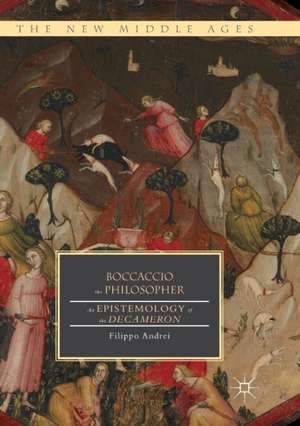Boccaccio the Philosopher: An Epistemology of the Decameron: The New Middle Ages
Autor Filippo Andreien Limba Engleză Paperback – 18 mai 2018
| Toate formatele și edițiile | Preț | Express |
|---|---|---|
| Paperback (1) | 580.68 lei 6-8 săpt. | |
| Springer International Publishing – 18 mai 2018 | 580.68 lei 6-8 săpt. | |
| Hardback (1) | 586.05 lei 6-8 săpt. | |
| Springer International Publishing – 19 oct 2017 | 586.05 lei 6-8 săpt. |
Din seria The New Middle Ages
- 20%
 Preț: 690.01 lei
Preț: 690.01 lei - 17%
 Preț: 457.58 lei
Preț: 457.58 lei - 20%
 Preț: 629.01 lei
Preț: 629.01 lei - 18%
 Preț: 782.42 lei
Preț: 782.42 lei - 15%
 Preț: 636.80 lei
Preț: 636.80 lei - 8%
 Preț: 537.27 lei
Preț: 537.27 lei - 20%
 Preț: 566.94 lei
Preț: 566.94 lei - 9%
 Preț: 626.77 lei
Preț: 626.77 lei - 20%
 Preț: 629.10 lei
Preț: 629.10 lei -
 Preț: 347.97 lei
Preț: 347.97 lei - 8%
 Preț: 563.62 lei
Preț: 563.62 lei - 9%
 Preț: 626.68 lei
Preț: 626.68 lei - 15%
 Preț: 524.70 lei
Preț: 524.70 lei - 8%
 Preț: 459.88 lei
Preț: 459.88 lei -
 Preț: 303.51 lei
Preț: 303.51 lei -
 Preț: 389.70 lei
Preț: 389.70 lei -
 Preț: 390.63 lei
Preț: 390.63 lei -
 Preț: 383.93 lei
Preț: 383.93 lei -
 Preț: 385.62 lei
Preț: 385.62 lei -
 Preț: 390.25 lei
Preț: 390.25 lei -
 Preț: 385.25 lei
Preț: 385.25 lei - 5%
 Preț: 712.81 lei
Preț: 712.81 lei - 15%
 Preț: 640.06 lei
Preț: 640.06 lei -
 Preț: 398.15 lei
Preț: 398.15 lei -
 Preț: 393.35 lei
Preț: 393.35 lei - 18%
 Preț: 725.13 lei
Preț: 725.13 lei - 18%
 Preț: 724.17 lei
Preț: 724.17 lei -
 Preț: 388.90 lei
Preț: 388.90 lei - 15%
 Preț: 698.30 lei
Preț: 698.30 lei -
 Preț: 386.39 lei
Preț: 386.39 lei -
 Preț: 387.38 lei
Preț: 387.38 lei -
 Preț: 384.48 lei
Preț: 384.48 lei - 18%
 Preț: 726.69 lei
Preț: 726.69 lei -
 Preț: 385.08 lei
Preț: 385.08 lei - 15%
 Preț: 639.14 lei
Preț: 639.14 lei -
 Preț: 388.72 lei
Preț: 388.72 lei -
 Preț: 389.11 lei
Preț: 389.11 lei -
 Preț: 387.20 lei
Preț: 387.20 lei - 15%
 Preț: 697.97 lei
Preț: 697.97 lei - 15%
 Preț: 640.24 lei
Preț: 640.24 lei - 15%
 Preț: 499.92 lei
Preț: 499.92 lei -
 Preț: 388.72 lei
Preț: 388.72 lei -
 Preț: 387.96 lei
Preț: 387.96 lei - 15%
 Preț: 579.20 lei
Preț: 579.20 lei -
 Preț: 391.40 lei
Preț: 391.40 lei - 15%
 Preț: 640.37 lei
Preț: 640.37 lei - 15%
 Preț: 641.71 lei
Preț: 641.71 lei -
 Preț: 384.70 lei
Preț: 384.70 lei
Preț: 580.68 lei
Preț vechi: 683.15 lei
-15% Nou
Puncte Express: 871
Preț estimativ în valută:
111.13€ • 115.59$ • 91.74£
111.13€ • 115.59$ • 91.74£
Carte tipărită la comandă
Livrare economică 12-26 aprilie
Preluare comenzi: 021 569.72.76
Specificații
ISBN-13: 9783319879536
ISBN-10: 3319879537
Pagini: 259
Ilustrații: XI, 259 p.
Dimensiuni: 148 x 210 mm
Greutate: 0.33 kg
Ediția:Softcover reprint of the original 1st ed. 2017
Editura: Springer International Publishing
Colecția Palgrave Macmillan
Seria The New Middle Ages
Locul publicării:Cham, Switzerland
ISBN-10: 3319879537
Pagini: 259
Ilustrații: XI, 259 p.
Dimensiuni: 148 x 210 mm
Greutate: 0.33 kg
Ediția:Softcover reprint of the original 1st ed. 2017
Editura: Springer International Publishing
Colecția Palgrave Macmillan
Seria The New Middle Ages
Locul publicării:Cham, Switzerland
Cuprins
INTRODUCTION: The Language of Knowledge in the Decameron.- Deified Men and Humanized Gods: The Epistemic Character of the Fabula.- Boccaccio's Mountain and the Voyage of the Soul.- The Motto and the Enigma: Rhetoric and Knowledge in the Sixth Day.- Practical Philosophy and Theory of Action in the Decameron.- CONCLUSION. Further Epistemological Considerations and Broader Implications.
Notă biografică
Filippo Andrei is Adjunct Professor at the California State University International Program in Florence. He has previously held the position of Lecturer at the University of California, Berkeley and San Francisco State University. Born in Florence, his research interests include Italian Literature, Romance Philology and Medieval Latin Literature. His essays have appeared in several specialized journals.
Textul de pe ultima copertă
This book explores the tangled relationship between literary production and epistemological foundation as exemplified in one of the masterpieces of Italian literature. Filippo Andrei argues that Giovanni Boccaccio's Decameron has a significant though concealed engagement with philosophy, and that the philosophical implications of its narratives can be understood through an epistemological approach to the text. He analyzes the influence of Dante, Petrarch, Thomas Aquinas, Aristotle, and other classical and medieval thinkers on Boccaccio's attitudes towards ethics and knowledge-seeking. Beyond providing an epistemological reading of the Decameron, this book also evaluates how a theoretical reflection on the nature of rhetoric and poetic imagination can ultimately elicit a theory of knowledge.
Caracteristici
Offers knowledge and analysis for a wide range of scholars including philosophers, postcolonial scholars, literary medievalists, and those interested in comparative literature Complicates Boccaccio’s famed Decameron through a comprehensive analysis of the work’s philosophical implications Connects Boccaccio to a wider discussion about the history of literature, philosophy, and epistemology particularly within a medieval context Includes supplementary material: sn.pub/extras
